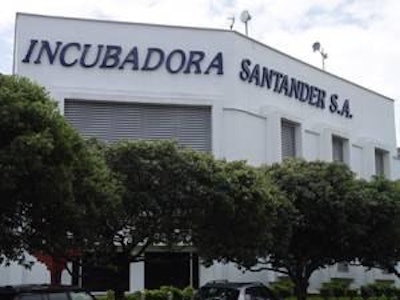
Incubadora Santander produces 4 million eggs each day, making it the largest egg producer in Colombia. The company has in excess of 5 million layers across two locations.
Some 4 million birds are kept in southwest Colombia, in Caloto, close to Cali, and reared in modern cage systems. In addition, the company has more than 1 million hens in the north east of the country. The company is completely integrated, with breeding stock, layers, a feed factory, tray manufacture and a transport and distribution system delivering directly to shops.
Evolution
Enrique Muñoz, who was in the poultry business for over 50 years, explained that Incubadora Santander started business selling day-old chicks and was the exclusive owner of breeding stock.
“There was the great crisis of 1990 and 1991 when nobody wanted to buy chicks. We had two options. Either leave the business or to start commercial egg production,” he explained. “This was how we entered the sector.”
It was at this point that he realized that there had to be a change in the way that eggs are produced in Colombia. Continuing with floor rearing was no longer viable. As part of this decision to bring about change, Muñoz went to Spain to learn about how to keep hens in battery cages, and while there he bought sufficient equipment to furnish 10 hen houses.
“I knew that this would work and that it was the way to change egg production, but overnight, we had to change everyone’s way of thinking, and by everyone, I mean staff, friends, partners – everyone.”
Growth and expansion
Change, however, is rarely free of problems.
“It’s easy to think that producing a million eggs will be straightforward, but that’s not really the case. It took us all of eight years in Cauca, and that was with making the best use of the incentives offered by the local government.
“In 2006, we ran into a problem. We were the largest egg producer and consequently believed that we were the strongest, but this was not the case. Just the opposite, in fact. We were among the weakest because we believed that we had to supply all of our eggs to wholesalers.”
The wholesalers, not the egg producers, controlled the market, and Incubadora Santander decided that this had to change. The company started selling directly to retailers. To bring about this change they bought 200 trucks based across the country, and started selling eggs under the brand name Huevos Kike. Today, the company’s eggs are sold in 14 cities, including Bogota, Cali, Medellin, Bucaramanga and Cartagena.
Muñoz explains that the company has two approaches to the business. One is simply production; the company now accounts for 12 percent of commercial egg production in Colombia. The other approach is supply, and Incubadora is able to supply 85 percent of the country on a daily basis. As a consequence, it is the only company that has a strong position across the whole of Colombia.
There are, however, competitors coming up behind, but this is not of too much concern.
“While we can talk about producing 4 million units a day, others are still at around only the 1 million mark.”
Colombia-US free trade agreement
The outlook for the Colombian market is changing with the coming into force of the U.S.-Colombia free trade agreement last year. What impact is this expected to have on the Colombian industry?
“Speaking exclusively as an egg producer, for me, the free trade agreement needs to be looked at from two distinct angles – the professional and the political. In the professional sense, I believe that there is a very strong future for egg production, but there needs to be major change. There are three areas in particular where this change is needed: mentality, investment opportunities and technology,” said Muñoz.
Just as Incubadora Santander has to evolve from being a supplier of day-old chicks into a supplier of eggs to the retail trade, now there have to be changes in management and marketing across the board.
“We have to stop being simply sellers of eggs and become poultry professionals!”
As part of this change, there needs to be production of not only eggs but also of egg products and entry into markets such as catering supply, Muñoz argued.
“I don’t see the free trade agreement as a problem for the egg sector, however, we have to undergo a total transformation. There are farms that need to disappear, because of their outdated methods and equipment, and there needs to be a complete revolution on the commercial side.”
Yet, there remain problems on the political side, and a feeling that the government of Colombia still needs to work on defining policy.
“You either want to create a significant industry, or you want to please the backyard producer. In addition, the government wants us to enter the export market, but to export we need to improve our health status. How can we export when we still have bronchitis and Newcastle disease?”
Future plans and egg products
The Colombian poultry industry remains highly fragmented, and in light of the free trade agreement, this could be an ideal time for a large company to start acquiring smaller competitors. Yet for Incubadora Santander, this does not form part of its strategy, citing that competitors tend to be ill-equipped, and that investment would be better placed in new sites.
With regard to egg products, the company is conscious of the fact that this an area that it needs to enter, but this is not as straightforward as it may seem.
“There we have a problem,” said Muñoz. “Do we want to be pioneers, colonizers or beneficiaries? These are quite distinct approaches. The pioneers strike out, knocking down obstacles; the colonizer improves on what the pioneer has achieved; and lastly, the beneficiary steps in.
“Yet there is a further aspect to be considered. Who will buy these products? The industrialized food industry is Colombia is also fragmented and not very large, so perhaps not the best option as customers.
“Bakers, for example, still in many cases buy shell eggs that may be broken or dirty and without certification that they are Salmonella-free. Even the larger producers, of which there are few, sometimes buy shell eggs when the price is low and break them by hand.”
So there needs to be change across the whole Colombian egg sector, particularly as the market opens. No doubt, a point of reference will be Incubadora Santander.


















